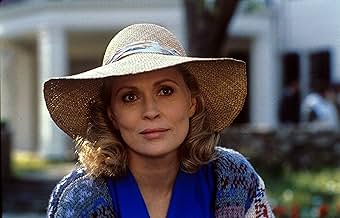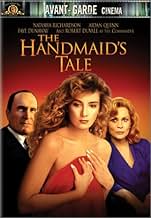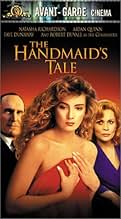Under a dystopian religious tyranny, most women cannot conceive children. Those young women who can live in a form of sexual slavery to provide children for influential families.Under a dystopian religious tyranny, most women cannot conceive children. Those young women who can live in a form of sexual slavery to provide children for influential families.Under a dystopian religious tyranny, most women cannot conceive children. Those young women who can live in a form of sexual slavery to provide children for influential families.
- Director
- Writers
- Stars
- Awards
- 2 wins & 1 nomination total
Reiner Schöne
- Luke
- (as Rainer Schoene)
Robert D. Raiford
- Dick
- (as Robert Raiford)
- Director
- Writers
- All cast & crew
- Production, box office & more at IMDbPro
Featured reviews
I finally watched this after watching the TV show and if anything, it shows that some books should not be adapted unless there is enough time to tell the story.
The film tries to feature the key moments that the TV show had time to bring up, and 90 minutes (or so) simply isn't enough.
The casting is flawed on several characters, like many reviewers point at, and the script feels rushed, which of course creates the feeling that the story progresses without any logic.
Nonetheless you will find some scenes are really good, and in fact, those same scenes found their way into the TV show.
The atmosphere of the book is well conveyed, I just wish they had had more time, which the largely superior TV show had.
Watch this for reference after reading the book, after watching the show : great books can make awesome TV shows but poor films sometimes.
The film tries to feature the key moments that the TV show had time to bring up, and 90 minutes (or so) simply isn't enough.
The casting is flawed on several characters, like many reviewers point at, and the script feels rushed, which of course creates the feeling that the story progresses without any logic.
Nonetheless you will find some scenes are really good, and in fact, those same scenes found their way into the TV show.
The atmosphere of the book is well conveyed, I just wish they had had more time, which the largely superior TV show had.
Watch this for reference after reading the book, after watching the show : great books can make awesome TV shows but poor films sometimes.
The handmaids in brilliant red, the wives in electric blue, the children in white--Margaret Atwood's neo-fascist state comes startingly alive in Schloendorff's film. The bright colors are oppressive in their uniformity, whether in the "ceremony"--Robert Duvall's passionless copulation with Natasha Richardson as she lies in the lap of his sterile wife, Faye Dunaway--or in the party to celebrate the birth of a handmaid's child, or the execution of another handmaid for fornication. There are several fine actors--Elizabeth McGovern and Aidan Quinn also play memorable, if brief, roles--but the cinematography steals the show here, giving this anti-Utopia the same oppressive tension as the original 1984 and far surpassing any version of Brave New World. It may be that Atwood's book, which I haven't read, adds layers of depth to the characters and plot, but Schloendorff's visualisation is a real enhancement to the tale. He creates the tension of a police state with only momentary intrusions of brutality or machinery. A strong film that will gain its following with time.
I'm surprised by some of the negative comments on this film. In my opinion, it represents the best kind of literary adaptation that the cinema offers: One in which the screenwriter and director clearly remained faithful to the spirit of the book without attempting to reproduce it. How can you go wrong with a Margaret Atwood book, a Harold Pinter screenplay and Volker Schlöndorff's direction? Some have suggested that the film suffered from "wooden" acting. Personally, I thought it was a fantastic cast: Robert Duvall and Victoria Tennant at their evil best; Faye Dunnaway as the "defeated" wife; Elizabeth McGovern as saucy as ever; Aidan Quinn and Natascha Richardson in the necessarily bland roles that drive the narrative. What holes here?
Commercial film doesn't get any better. "The Handmaid's Tale" is a dark portrait of a world unlike ours and yet so much like ours... in which a right-wing, bureaucratic patriarchy dominates the land. Women have three main functions (for which their clothing is color coded): Red for the handmaids, who are walking wombs; white for the innnocent children; blue for the sterile trophy wives. Brown is worn by the "aunts", a futuristic equivalent of the Sonderkomando (i.e., Jews who worked on behalf of the Nazi's in the death camps), evil schoolmistress types who both train/brainwash young women for assignment and occasionally destroy them. A fifth function, for which the garb is particularly interesting, is "working" in Gilead's underground social club (essentially a den of iniquity, rife with prostitution and drugs.) Point is... by splitting up these functions, hasn't Atwood described the basic roles that women play within our own male-dominated society, in various different permutations and combinations? To the patriarchy, women are mothers, models, sluts, angels and, when professionals, they are not to aspire to more teaching posts. In Gilead, the lines are clearer; in our own society, aren't most women "supposed to" play some combination of all of these roles?
I get the feeling that most moviegoers are looking for something else in "sci-fi." Here's a new plot twist: The rebels feed Kate some kind of medication that allows her to read the commander's mind while destroying his brain. Wait... that's "Scanners." Oops. Seriously, two of the reviews on this site made spedific mention of Schlöndorff's "horrible", "atrocious" directorial skills. Ahem. Perhaps before they weigh in on the auteur, they ought to see "Young Törless", "Coup de grâce", "The Tin Drum" and all of his other wonderful efforts. As a matter of fact, to insinuate that someone who could bring Grass' Tin Drum to the screen in such a stunning fashion is a lousy director is PREPOSTEROUS. Schlöndorff is a giant of the New German Cinema, and it underscores the ignorance of the Hollywooders when they cast such baseless aspersions.
Commercial film doesn't get any better. "The Handmaid's Tale" is a dark portrait of a world unlike ours and yet so much like ours... in which a right-wing, bureaucratic patriarchy dominates the land. Women have three main functions (for which their clothing is color coded): Red for the handmaids, who are walking wombs; white for the innnocent children; blue for the sterile trophy wives. Brown is worn by the "aunts", a futuristic equivalent of the Sonderkomando (i.e., Jews who worked on behalf of the Nazi's in the death camps), evil schoolmistress types who both train/brainwash young women for assignment and occasionally destroy them. A fifth function, for which the garb is particularly interesting, is "working" in Gilead's underground social club (essentially a den of iniquity, rife with prostitution and drugs.) Point is... by splitting up these functions, hasn't Atwood described the basic roles that women play within our own male-dominated society, in various different permutations and combinations? To the patriarchy, women are mothers, models, sluts, angels and, when professionals, they are not to aspire to more teaching posts. In Gilead, the lines are clearer; in our own society, aren't most women "supposed to" play some combination of all of these roles?
I get the feeling that most moviegoers are looking for something else in "sci-fi." Here's a new plot twist: The rebels feed Kate some kind of medication that allows her to read the commander's mind while destroying his brain. Wait... that's "Scanners." Oops. Seriously, two of the reviews on this site made spedific mention of Schlöndorff's "horrible", "atrocious" directorial skills. Ahem. Perhaps before they weigh in on the auteur, they ought to see "Young Törless", "Coup de grâce", "The Tin Drum" and all of his other wonderful efforts. As a matter of fact, to insinuate that someone who could bring Grass' Tin Drum to the screen in such a stunning fashion is a lousy director is PREPOSTEROUS. Schlöndorff is a giant of the New German Cinema, and it underscores the ignorance of the Hollywooders when they cast such baseless aspersions.
This movie, based on Margaret Atwood's story, concerns a woman living in the not too distant future in the Republic of Gilead, a country that was once the United States. The country is now run by fundamentalist Christians who have demoted all women to a second class citizenship. Nuclear war has made most women infertile, so the government has forced all the fertile women to serve as handmaids and bear children for the leaders and their infertile wives as part of a biblical prophecy. The infertile women are sent off to toil as slaves and clean up nuclear waste. This movie concerns one handmaid, Offred (Kate) and her struggle to escape Gilead, find her daughter, and flee to Canada. Not a bad movie at all, all the actors do very well. The material just runs very slow at points, and the character's aren't all that well developed.
I have just one point to make about this film, and that is why on earth did the director decided to name Offred kate. In the book, which I hope to god the producers etc actually read, there is no mention of the name kate what so ever, the only name that we could possibly guess would be June which is supplied to us in the first chapter but even then we never learn her real name. And this is of great significant importance, the fact that we as readers or viewers never learn her name means something and to simply choose a name out of a hat is destroying a piece of the character created for us by Margaret Attwood. Also reading the plot outline makes me wonder whether whoever wrote that even saw the film, especially where it says "Kate is a criminal, guilty of the crime of trying to escape from the US, and is sentenced to become a Handmaid." when really "KATE" becomes a handmaid as her husband was married once before and their marriage never really existed in the eyes of the law. Also i read on to see that "After ruthless group training by Serena Joy in the proper way to behave, Kate is assigned as Handmaid to the Commander." Well that is not at all true as anyone who has seen this film will notice that Serena Joy is the commanders wife and not one of the Aunts and the Red Centre. Please in the future get your facts right and also thanks to director Volker Schlöndorff for ruining a perfectly enjoyable book. My advice stick to the book and not the watered down version for the small minded.
Did you know
- TriviaWhile working on the film, Robert Duvall became so fascinated with evangelism that it inspired him to write The Apostle (1997).
- GoofsWhen Moira ties up Aunt Lydia and escapes the Red Center, it is late at night, but moments later, when she exits, it is clearly daytime.
- SoundtracksWhispering Hope
Written by Septimus Winner as Alice Hawthorne
- How long is The Handmaid's Tale?Powered by Alexa
Details
- Release date
- Countries of origin
- Official site
- Language
- Also known as
- El cuento de la doncella
- Filming locations
- James Adams Buchanan House, 1810 Cedar St, Durham, North Carolina, USA(Commander Fred's house)
- Production companies
- See more company credits at IMDbPro
Box office
- Gross US & Canada
- $4,960,385
- Opening weekend US & Canada
- $738,578
- Mar 11, 1990
- Gross worldwide
- $4,960,385
- Runtime
- 1h 48m(108 min)
- Color
- Sound mix
- Aspect ratio
- 1.85 : 1
Contribute to this page
Suggest an edit or add missing content








































